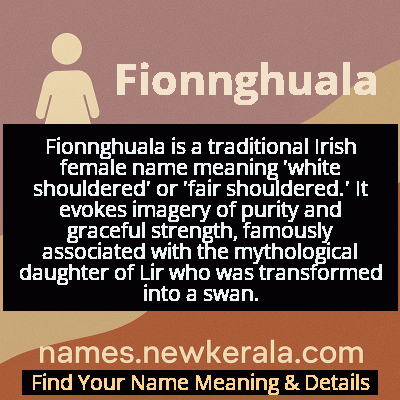Fionnghuala Name Meaning & Details
Origin, Popularity, Numerology Analysis & Name Meaning of Fionnghuala
Discover the origin, meaning, and cultural significance of the name FIONNGHUALA. Delve into its historical roots and explore the lasting impact it has had on communities and traditions.
Name
Fionnghuala
Gender
Female
Origin
Irish
Lucky Number
9
Meaning of the Name - Fionnghuala
Fionnghuala is a traditional Irish female name meaning 'white shouldered' or 'fair shouldered.' It evokes imagery of purity and graceful strength, famously associated with the mythological daughter of Lir who was transformed into a swan.
Fionnghuala - Complete Numerology Analysis
Your Numerology Number
Based on Pythagorean Numerology System
Ruling Planet
Mars
Positive Nature
Generous, passionate, energetic, and humanitarian.
Negative Traits
Impulsive, impatient, moody, and can be overly emotional.
Lucky Colours
Red, maroon, scarlet.
Lucky Days
Tuesday.
Lucky Stones
Red coral, garnet.
Harmony Numbers
1, 2, 3, 6.
Best Suited Professions
Military, sports, philanthropy, leadership roles.
What People Like About You
Courage, energy, leadership, generosity.
Famous People Named Fionnghuala
Fionnghuala O'Reilly
Irish chieftain
Powerful female leader who defended O'Reilly clan territories in 16th century Cavan
Fionnghuala Manon
Contemporary artist
Irish visual artist known for paintings exploring Celtic mythology and feminine perspectives
Fionnghuala ní Shúilleabháin
Traditional singer
Preserved Sean-nós singing traditions from Connemara Gaeltacht region
Name Variations & International Equivalents
Click on blue names to explore their detailed meanings. Gray names with will be available soon.
Cultural & Historical Significance
The name embodies the Celtic reverence for swans as sacred creatures capable of moving between worlds, connecting human and natural realms. In historical contexts, women named Fionnghuala often came from aristocratic Gaelic families, reflecting the name's association with nobility and cultural leadership. The legend itself served as an allegory for the Irish people's resilience under foreign domination, with Fionnghuala representing the enduring spirit of Ireland—beautiful, loyal, and ultimately triumphant despite prolonged suffering. This mythological foundation has made the name a symbol of cultural preservation and feminine strength in Irish tradition.
Extended Personality Analysis
Women named Fionnghuala are typically characterized by a unique blend of graceful strength and deep emotional resilience. Drawing from the mythological figure's role as protector and guide during centuries of enchantment, modern Fionnghualas often exhibit strong nurturing instincts and a fierce loyalty to family and community. They tend to be perceptive and intuitive, with an ability to read situations and people with remarkable accuracy. There's often a creative or artistic dimension to their personality—many are drawn to music, writing, or visual arts that allow them to express their deep connection to heritage and nature.
Fionnghualas typically possess a quiet dignity and inner strength that enables them to face challenges with remarkable composure. Unlike more aggressive personality types, their power lies in endurance, wisdom, and the ability to maintain grace under pressure. They often serve as the emotional anchor in their relationships, providing stability and perspective during turbulent times. Many display a strong sense of tradition balanced with modern adaptability—they honor their roots while navigating contemporary life with intelligence and flexibility. Their 'white shoulder' symbolism often manifests as bearing responsibilities with lightness and purity of intention, never allowing burdens to diminish their essential spirit or compassion for others.
Modern Usage & Popularity
In contemporary usage, Fionnghuala remains a distinctly Irish name that signals strong cultural connections and traditional values. While it has never reached widespread popularity, it maintains a steady presence particularly in Irish-speaking communities and among families committed to preserving Gaelic language and heritage. The name saw a modest revival during the Celtic Tiger era as part of broader cultural rediscovery, though it remains outside the top 100 names in Ireland. The anglicized spelling 'Fionnuala' is more commonly encountered, while the traditional 'Fionnghuala' spelling is preferred by Irish language purists and in Gaeltacht regions. Internationally, the name appears occasionally in Irish diaspora communities, particularly in the United States, Canada, and Australia, where it serves as a meaningful cultural marker. The diminutive 'Nuala' has gained independent popularity as both a standalone name and nickname, making the full Fionnghuala feel more formal and traditional. Current usage trends show the name being chosen by educated, culturally-aware parents seeking meaningful names with deep mythological roots rather than following fashion trends.
Symbolic & Spiritual Meanings
Fionnghuala carries rich symbolic meanings that extend beyond its literal translation of 'white shouldered.' The white shoulder represents purity, illumination, and the bearing of responsibility with grace—suggesting someone who carries burdens without being weighed down by them. In Celtic symbolism, white connects to spiritual enlightenment, truth, and the Otherworld, while the shoulder symbolizes strength, support, and the ability to carry both literal and metaphorical weight. The mythological association with swans adds layers of transformation, beauty, loyalty, and the ability to navigate different realms—earth, water, and air representing the physical, emotional, and spiritual dimensions of existence.
The name symbolizes the bridge between human and divine, mortal and immortal, reflecting the Celtic belief in the permeability between worlds. It represents enduring love and familial bonds that transcend physical form and temporal constraints. In broader terms, Fionnghuala embodies the Irish spirit itself—capable of profound transformation while maintaining essential identity, beautiful in suffering, loyal through adversity, and ultimately triumphant. The 900-year journey of the mythological Fionnghuala symbolizes the soul's journey through various stages of spiritual development, with each phase of the enchantment representing different life challenges and lessons in endurance, faith, and ultimate redemption.

